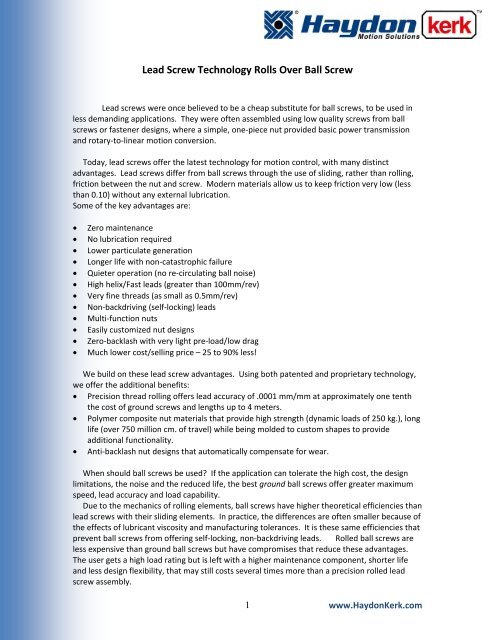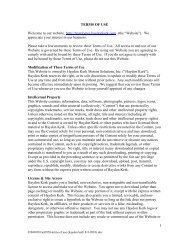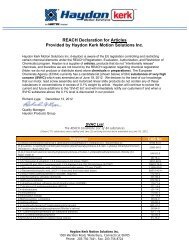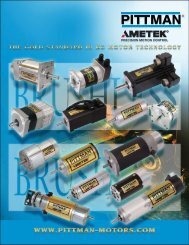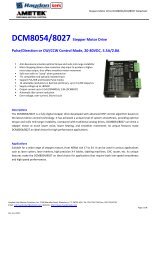Lead Screw Technology Rolls Over Ball Screws - Haydon Kerk ...
Lead Screw Technology Rolls Over Ball Screws - Haydon Kerk ...
Lead Screw Technology Rolls Over Ball Screws - Haydon Kerk ...
Create successful ePaper yourself
Turn your PDF publications into a flip-book with our unique Google optimized e-Paper software.
<strong>Lead</strong> <strong>Screw</strong> <strong>Technology</strong> <strong>Rolls</strong> <strong>Over</strong> <strong>Ball</strong> <strong>Screw</strong><br />
<strong>Lead</strong> screws were once believed to be a cheap substitute for ball screws, to be used in<br />
less demanding applications. They were often assembled using low quality screws from ball<br />
screws or fastener designs, where a simple, one‐piece nut provided basic power transmission<br />
and rotary‐to‐linear motion conversion.<br />
Today, lead screws offer the latest technology for motion control, with many distinct<br />
advantages. <strong>Lead</strong> screws differ from ball screws through the use of sliding, rather than rolling,<br />
friction between the nut and screw. Modern materials allow us to keep friction very low (less<br />
than 0.10) without any external lubrication.<br />
Some of the key advantages are:<br />
• Zero maintenance<br />
• No lubrication required<br />
• Lower particulate generation<br />
• Longer life with non‐catastrophic failure<br />
• Quieter operation (no re‐circulating ball noise)<br />
• High helix/Fast leads (greater than 100mm/rev)<br />
• Very fine threads (as small as 0.5mm/rev)<br />
• Non‐backdriving (self‐locking) leads<br />
• Multi‐function nuts<br />
• Easily customized nut designs<br />
• Zero‐backlash with very light pre‐load/low drag<br />
• Much lower cost/selling price – 25 to 90% less!<br />
We build on these lead screw advantages. Using both patented and proprietary technology,<br />
we offer the additional benefits:<br />
• Precision thread rolling offers lead accuracy of .0001 mm/mm at approximately one tenth<br />
the cost of ground screws and lengths up to 4 meters.<br />
• Polymer composite nut materials that provide high strength (dynamic loads of 250 kg.), long<br />
life (over 750 million cm. of travel) while being molded to custom shapes to provide<br />
additional functionality.<br />
• Anti‐backlash nut designs that automatically compensate for wear.<br />
When should ball screws be used? If the application can tolerate the high cost, the design<br />
limitations, the noise and the reduced life, the best ground ball screws offer greater maximum<br />
speed, lead accuracy and load capability.<br />
Due to the mechanics of rolling elements, ball screws have higher theoretical efficiencies than<br />
lead screws with their sliding elements. In practice, the differences are often smaller because of<br />
the effects of lubricant viscosity and manufacturing tolerances. It is these same efficiencies that<br />
prevent ball screws from offering self‐locking, non‐backdriving leads. Rolled ball screws are<br />
less expensive than ground ball screws but have compromises that reduce these advantages.<br />
The user gets a high load rating but is left with a higher maintenance component, shorter life<br />
and less design flexibility, that may still costs several times more than a precision rolled lead<br />
screw assembly.<br />
1<br />
www.<strong>Haydon</strong><strong>Kerk</strong>.com
<strong>Lead</strong> <strong>Screw</strong> <strong>Technology</strong> <strong>Rolls</strong> <strong>Over</strong> <strong>Ball</strong> <strong>Screw</strong><br />
Top quality lead screws outperform both inexpensive lead screws and more expensive ball<br />
screws. They also cost less to use. <strong>Lead</strong> screws are an enabling technology. Without them some<br />
products would never make it to market. Here are some examples.<br />
<strong>Lead</strong> screws work well in wash down environments. The materials used and the lubricant‐<br />
free operation allows total immersion in water, or many other fluids.<br />
Miniature lead screws, with and without antibacklash compensation provide precision<br />
motion in a package size unmatched by other technologies. The ability to produce a high<br />
accuracy screw and nut, 2 to 4 mm in diameter, with custom features has succeeded in bringing<br />
the latest data storage drives and telecommunications equipment to market.<br />
The screws shown here are all less than 80mm long, with both right‐hand and left‐hand threads,<br />
and leads as fine as 0.65mm.<br />
2<br />
www.<strong>Haydon</strong><strong>Kerk</strong>.com
<strong>Lead</strong> <strong>Screw</strong> <strong>Technology</strong> <strong>Rolls</strong> <strong>Over</strong> <strong>Ball</strong> <strong>Screw</strong><br />
At the other end of the spectrum, lead screws can have very fast leads, up to<br />
100mm/rev so far, that are efficient and accurate. This type of thread has been very successful<br />
in high‐speed automation, including semiconductor handling, laser scanning and engraving,<br />
transportation door actuation and valve actuation.<br />
These screws, with leads of more than 75mm/rev and diameters of 20 to 25mm can be readily<br />
supplied in lengths over 4 meters! This would be impossible for a ball screw. Thread grinding<br />
cannot produce these high‐helix leads and the cost of a 4 meter ground screw would huge. Yet<br />
the best lead screws are produced in many leads with standard accuracy of 0.0006 mm/mm and<br />
special accuracy to 0.0001mm/mm. Rolled multi‐start threads also avoid thread drunkenness<br />
caused by pitch‐to‐pitch error of ground or cut multi‐start threads.<br />
High helix, fast leads are possible in smaller diameters as well. We produce screws of 3mm<br />
diameter with leads of 10mm/rev. <strong>Screw</strong>s with 6mm diameter and 25mm/rev leads are very<br />
popular in all types of equipment, including printing and scanning, data storage, medical<br />
analysis, paper handling, semiconductor handling and light industrial applications.<br />
3<br />
www.<strong>Haydon</strong><strong>Kerk</strong>.com
<strong>Lead</strong> <strong>Screw</strong> <strong>Technology</strong> <strong>Rolls</strong> <strong>Over</strong> <strong>Ball</strong> <strong>Screw</strong><br />
Here are some fast lead screws used in data storage systems. These are 4 and 6mm diameter.<br />
Notice also the complex precision molded nuts. These nuts have added functions that reduce<br />
part count, reduce tolerance stack‐up, outlive, outperform and reduce overall product cost<br />
compared to more expensive ball screws and less expensive competitors’ lead screws.<br />
The benefit of multifunction, custom‐molded lead nuts is great. Using a variety of materials,<br />
lead screws offer higher performance at lower costs. Some additional examples of multifunction<br />
nuts follow. Imagine how many parts would be needed to perform the functions if only a<br />
standard nut configuration was available. Then, try to imagine getting this type of customization<br />
in a ball nut!<br />
4<br />
www.<strong>Haydon</strong><strong>Kerk</strong>.com
<strong>Lead</strong> <strong>Screw</strong> <strong>Technology</strong> <strong>Rolls</strong> <strong>Over</strong> <strong>Ball</strong> <strong>Screw</strong><br />
Complex assemblies are reduced to single components. Complete solutions are custom<br />
engineered and delivered at a lower cost, and usually in less time, than standard offerings from<br />
competitive technologies.<br />
Here, the nut incorporates the carriage and linear guide block. Although this is a high value lead<br />
screw, the customer sees reduced component costs and a dramatic simplification of assembly<br />
and alignment.<br />
5<br />
www.<strong>Haydon</strong><strong>Kerk</strong>.com


